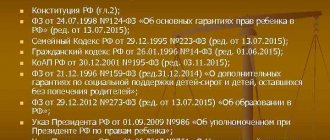How to protect the rights of minors?
In accordance with Art. 56 of the Family Code of the Russian Federation (hereinafter referred to as the Family Code of the Russian Federation), a child has the right to protection of his rights and interests protected by law, which is carried out in the manner prescribed by law, i.e. through the use of proper form and methods of protection.
The provisions of this article establish that the protection of the rights and legitimate interests of the child is carried out by parents (persons replacing them), and in cases provided for by this Code, by the guardianship and trusteeship authority, the prosecutor and the court. A minor, recognized in accordance with the law as fully capable before reaching the age of majority, has the right to independently exercise his rights and obligations, including the right to defense.
In addition, the child also has the right to protection from abuse by parents (persons replacing them).
In particular, in the event of a violation of the rights and legitimate interests of a child, including in the event of non-fulfillment or improper fulfillment by parents (one of them) of the responsibilities for raising, educating the child, or in the event of abuse of parental rights, the child has the right to independently apply for their protection to the guardianship and trusteeship authority , and upon reaching the age of fourteen years, to court.
Thus, a child who has reached the age of 14 has the right to go to court if his parents violate his property or personal non-property rights:
- live and be raised in a family (Article 54 of the RF IC)
- know your parents (Article 54 of the RF IC)
- to care from parents (Article 54 of the RF IC)
- for living together with parents (Article 54 of the RF IC)
- to be raised by his parents, ensure his interests, comprehensive development, respect for his human dignity (Article 54 of the RF IC)
- to communicate with both parents and other relatives (Article 55 of the RF IC)
- express your opinion (Article 57 of the RF IC)
- to the first name, patronymic and last name (Article 58 of the RF IC)
- to receive maintenance from their parents and other family members (clause 1 of article 60 of the RF IC)
- right of ownership (clause 3 of article 60 of the RF IC), etc.
The subjects involved in the implementation, protection and defense of the rights of the child, both in court and out of court, include:
- parents (one of them)
- persons in loco parentis (guardian, trustee, foster parent, foster carer, adoptive parent)
- guardianship authorities
- inspection for minors' affairs and protection of their rights
- prosecutor
- Commissioner for Children's Rights
- Commissioner for Human Rights
- actual educators
- persons who discovered a planted, planted child
- other persons and bodies charged by the law of the Russian Federation with the obligation to participate in the implementation, protection and defense of the rights of the child.
At the same time, the scope of powers of the persons mentioned above varies.
For example, parents and adoptive parents have the widest range of powers. These persons have the right to exercise any right of the child that he cannot independently realize.
In turn, the scope of powers of guardians, trustees, and adoptive parents is less than the scope of powers of parents and/or adoptive parents.
These persons act within the limits of the law and the agreement concluded with the guardianship and trusteeship authorities or the founder of the trust management.
However, in the event of a violation of the child’s rights by the parents, adoptive parents, or guardians or trustees, the responsibility for their protection rests primarily with the guardianship and trusteeship authorities, as well as with the prosecutor, who are obliged to protect the rights of the child, including in court:
- if it is necessary to collect alimony from parents/guardians in the event of the latter’s refusal to support the child
- in case of violation of the property rights of minors and changes in living conditions
- in case of violation of the rights of orphans and adopted children
- in case of violation of the rights of disabled children and children with disabilities
- in case of violation of the non-property rights of minors (the right to education, change of surname and name, to communicate with both parents in the event of divorce, etc.).
It should be separately noted that the competence of the guardianship and trusteeship authorities in all cases is entrusted with control over the actions of parents/guardians/trustees regarding the property rights of children.
In particular, there are a number of transactions, the conclusion of which is impossible without the approval of the guardianship and trusteeship authorities (Article 53 of the Civil Code of the Russian Federation, Article 121 of the RF IC), and which are aimed at:
- for the alienation of real estate, the co-owner of which is a child
- to change the child’s living conditions
- for collateral of real estate belonging to a child
- for renting or renting, as well as for providing free use to third parties of housing belonging to a minor child
- to renounce an inheritance belonging to a minor
- for transactions of purchase and sale of property belonging to an orphan child
- for the purchase and sale of real estate, the co-owner of which is a disabled child or a child with disabilities
- as well as other actions related to reducing the property of a minor.
Violation of the procedure for obtaining permission from the guardianship and trusteeship authorities or ignoring the opinion of these authorities on the part of parents/guardians gives the right to the guardianship or trusteeship authorities, or the prosecutor, to apply to the court with a demand to declare these transactions invalid, using restitution, in the form of returning the alienated property to ownership minor.
In addition, the guardianship and trusteeship authorities and the prosecutor also have the right to submit a claim to the court for deprivation of parental rights, for restriction of parental rights and for the collection of child support. The corresponding demand of the guardianship and trusteeship authority is formalized by a statement of claim to the court.
Also, the duties of the prosecutor, guardianship and trusteeship authorities, in order to protect the legal rights and interests of children, as well as to give an opinion on the case, include mandatory participation in the consideration of cases by courts:
- on the exercise of parental rights by a parent living separately from the child
- on deprivation of parental rights and restoration of parental rights
- on the restriction of parental rights and on the abolition of restrictions on parental rights
- on establishing the adoption of a child
- to cancel the adoption of a child.
Summarizing the above, we can conclude that the judicial protection of children’s rights in the Russian Federation is at a fairly high level. A legal framework has been created for the implementation of these rights. A system of social protection for various population groups, in particular children, is being developed. The social security system is also evolving. Various forms of assistance to children in difficult life situations have been identified.
The rights of the child in the family and the responsibility of parents
CHILD'S RIGHTS IN THE FAMILY AND PARENTAL RESPONSIBILITY
(extracts from the main legal documents)
Convention on the Rights of the Child (approved by the UN General Assembly on November 20, 1989).
For the full and harmonious development of his personality, a child needs to grow up in a family environment; in an atmosphere of happiness, love and understanding.
Article 5.
States Parties shall respect the responsibilities, rights and obligations of parents ... who are legally responsible for the child to properly manage and guide the child in the exercise of the rights recognized by this Convention and to do so in accordance with the developing abilities of the child.
Article 18.
Recognition of the principle of common and equal responsibility of both parents for the upbringing and development of the child.
Article 27.
The right of every child to a standard of living necessary for the physical, mental, spiritual, moral and social development of the child. Parents or other persons raising a child bear the primary responsibility for providing, within the limits of their abilities and financial resources, the living conditions necessary for the development of the child.
Constitution of the Russian Federation (as amended as of June 9, 2001).
Article 38.
clause 1. Motherhood and childhood, the family are protected by the state; clause 2. Caring for children and raising them is an equal right and responsibility of parents; p.Z. Able-bodied children over 18 years of age must take care of disabled parents.
Federal Law of July 24, 1998 No. 124-FZ “On the basic guarantees of the rights of the child in the Russian Federation” (as amended as of July 20, 2000).
Article 7.
clause 2. The child’s parents (persons replacing them) assist him in carrying out independent actions aimed at realizing and protecting his rights and legitimate interests, taking into account the child’s age and within the scope of the child’s legal capacity established by the legislation of the Russian Federation.
Article 9.
clause 1. When carrying out activities in the field of education and upbringing of a child in a family... the rights of the child cannot be infringed.
Article 15.
If the court determines that the parents (persons replacing them) are guilty of violating the rights and legitimate interests of children, compensation for harm caused to children is determined by the court, taking into account the necessary measures for social rehabilitation and social adaptation of children.
Article 23.
clause 1. Parents (persons replacing them) ... have the right to apply to the court in the manner prescribed by the legislation of the Russian Federation with a claim for compensation to the child for harm caused to his health, property, as well as moral damage.
Family Code of the Russian Federation dated December 29, 1995 No. 223-FZ (as amended as of January 2, 2000).
Article 54.
clause 2. Every child has the right to live and be raised in a family, as far as possible, the right to know his parents, the right to be cared for by them, and the right to live together with them, except in cases where this is contrary to his interests. A child has the right to be raised by his parents, to ensure his interests, comprehensive development, and respect for his human dignity.
Article 55.
clause 1. The child has the right to communicate with both parents, grandparents, brothers, sisters and other relatives. The dissolution of the parents' marriage, its recognition as invalid or the parents' separation do not affect the rights of the child; clause 2. A child in an extreme situation (detention, arrest, detention, being in a medical institution, etc.) has the right to communicate with his parents and other relatives in the manner prescribed by law.
Article 56.
clause 1. The child has the right to protection of his rights and legitimate interests. Protection of the rights and legitimate interests of the child is carried out by parents (persons replacing them), and in cases provided for by this Code, by the guardianship and trusteeship authority, the prosecutor and the court; clause 2. A child has the right to protection from abuse by parents (persons in their stead).
In the event of a violation of the rights and legitimate interests of a child, including in the event of non-fulfillment or improper fulfillment by parents (one of them) of the responsibilities for the upbringing, education of the child, or in the case of abuse of parental rights, the child has the right to independently apply for their protection to the guardianship and trusteeship authority, and reaching the age of 14 years in court.
Article 57.
A child has the right to express his opinion when resolving any issue in the family that affects his interests... Taking into account the opinion of a child who has reached the age of 10 is mandatory, except in cases where this is contrary to his interests.
Article 60.
clause 1. The child has the right to receive maintenance from his parents and other family members in the manner and in the amounts established by the Law; clause 2. The amounts due to the child as alimony, pensions, benefits are placed at the disposal of the parents (persons replacing them) and are spent by them on the maintenance, upbringing and education of the child.
Article 63.
clause 1. Parents have the right and responsibility to raise their children. Parents are responsible for the upbringing and development of their children. They are obliged to take care of the health, physical, mental, spiritual and moral development of their children. Parents have a priority right to raise their children over all other persons.
Article 64.
clause 1. The protection of the rights and interests of children rests with their parents. Parents are the legal representatives of their children and act in defense of their rights and interests in relations with any individuals and legal entities, including in the courts, without special powers.
Article 65.
clause 1. Parental rights cannot be exercised in conflict with the interests of children. Ensuring the interests of children should be the main concern of parents. When exercising parental rights, parents do not have the right to cause harm to the physical or mental health of children or their moral development. Methods of raising children must exclude neglectful, cruel, rude, degrading treatment, insult or exploitation. Parents who exercise parental rights to the detriment of the rights and interests of children are liable in accordance with the procedure established by law.
Law of the Russian Federation of July 10, 1992 No. 3266-1 “On Education” (as amended as of December 27, 2000).
Article 18.
p. 1. Parents are the first teachers. They are obliged to lay the foundations for the physical, moral and intellectual development of the child’s personality in early childhood.
Article 52.
clause 2. Parents (legal representatives) of students and pupils are obliged to comply with the charter of the educational institution; clause 4. Parents (legal representatives) of students and pupils are responsible for their upbringing and their receipt of basic general education.






